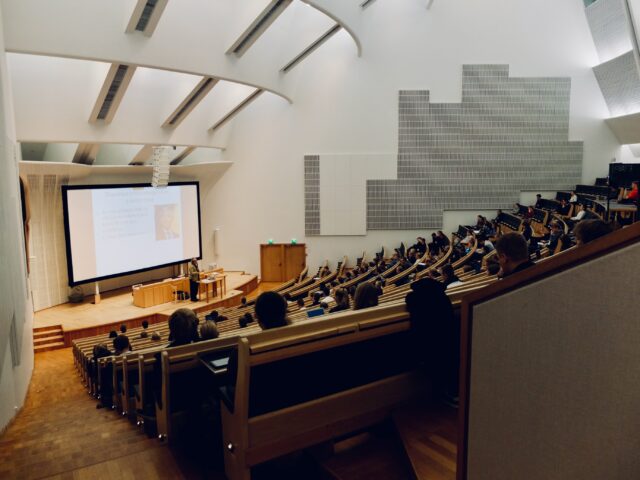The Toronto Star has reportedly received a copy of a “recognized institution” framework that the Government of Canada may use to determine which postsecondary institutions set a higher standard for international students. According to the Star, this framework could be used to determine the allocation of international student study permits for select universities and colleges. The Star says that the leaked draft from August identifies factors such as international student revenues, timely graduation, and funding devoted to international student mental health supports. The federal government has not commented upon whether this draft framework has been updated.

Top Ten News
February 9, 2024
13 members of parliament have requested that 27 universities provide details on how they are addressing antisemitism and Islamophobia on campus, as well as how they are protecting freedom of speech for faculty, staff, and students who speak about the conflict in Gaza. The MPs have signed a letter asking for university presidents to provide information regarding how they are addressing discrimination, ensuring freedom of speech and assembly, and engaging with student and staff unions to facilitate open dialogue. “We are deeply concerned about members of the university community being profiled, reprimanded, and in some cases, disciplined, for the exercise of legitimate freedom of speech, expression and association,” reads the letter.
Canadian Blood Services (CBS) is visiting campuses across Canada to recruit students to a potential stem cell donor database. Those who are between the ages of 17 and 35 are invited to have their information added to a database of potential matches for those in need of stem cell donations. CBS has already visited the University of New Brunswick and Mount Allison University and will appear on campuses in Prince Edward Island, Ontario, Manitoba, Alberta, and British Columbia in the coming weeks. “Universities tend to have the perfect demographic for us,” said CBS community development manager Chris vanDoorn. “There is a good audience of students there, lots of foot traffic.”
The University of Victoria will cut $13M (4%) out of its operating budget, reports the Times Colonist. The changes will be made to further address declining revenue due to a predicted decrease in the number of international student enrolments. UVic says that it will be necessary to reduce its staff, but that it will work with unions to minimize involuntary layoffs. The university’s VPs will decide on the reductions by department; some departments—such as the Student Wellness Centre and the Centre for Accessible Learning—will not face reductions. Times Colonist reports that UVic is not planning to increase tuition. Instead, the university intends to market itself to potential international students in Southeast Asia and the United States.
In a recent letter to college staff, Conestoga College President John Tibbits asserted that the college will be unfairly impacted by the impending changes to international student study permits. Tibbits writes that Conestoga began expanding the number of international students it enrolled in order to help address future workforce needs and that the revenue from this enrolment has been invested back into building state-of-the-art facilities. He further notes that Conestoga has never contracted its curriculum to a private college. “The full impact of the federal government’s cap on international students remains unknown, but we can say with certainty that we have been unfairly grouped with what the government and other critics refer to as ‘bad actors in the sector,’” he writes. The letter concludes by noting that while changes should be made, they should be phased in over time and implemented in a way that will not threaten Canada’s postsecondary reputation.
In a recent interview with EvoLLLution, Justin Smith (Saint Louis University) and Troy Hargrove (Saint Louis) discuss changes that institutions can make to shift from transactional interactions with learners to more relational interactions. Smith notes that asking more about why students are making requests—such as to drop courses—can help build relationships and provide insight into how an institution can increase retention. Smith and Hargrove also encourage building relationships by providing a listening ear for students and prioritizing relationships with adult learners to help them through their education journey. Smith notes that while virtual relationship building comes with challenges, their institution reaches out regularly to students and flags students who have not been active or who are having grade issues. Hargrove says that this approach has helped promote student success and make education accessible.
The Université du Québec à Montréal will offer two new graduate programs in osteopathy, starting in Fall 2024. These microprograms are designed for practicing osteopaths, with the goal of standardizing osteopathic knowledge across the discipline and encouraging an environment of continuous learning. The first of the microprograms covers osteopathic clinical safety, while the second is designed more broadly to keep practicing osteopaths up to date on clinical, practical, and communication skills. Both of these part-time programs are interdisciplinary and evidence-based in nature.
The University of Manitoba, the University of Windsor, and York University have partnered with the Canadian Teachers’ Federation, the British Columbia Teachers’ Federation, and the Canadian Centre for Policy Alternatives to establish a new initiative that advocates for robust public education systems. The Public Education Exchange (PEX) brings together collaborators, researchers, and advocates with the aim of making research more available, providing policymakers with valuable insights, and engaging the public. “We believe in highlighting the successes and potentials of public education while pointing out the potential damage caused by privatization policies,” said PEX project director Sue Winton (YorkU). “The focus is on fostering a system that embodies equity, reflects democratic values and prioritizes the collective well-being of society.”
Suncrest College will offer a new, one-year program where Suncrest students can earn a Liberal Arts Certificate from the University of Regina. Graduates of the program will have the opportunity to ladder the certificate into a diploma or full degree at the university. Suncrest will offer the program flexibly, using Yorkton as its main campus with remote delivery options available. “Having a one-year university option is great for anyone thinking about university but [who] is either not sure what degree to choose or is not ready to make a four-year commitment for a full bachelor’s degree,” said Suncrest Chair, Post Secondary Education Malena Vroom. The program will start in Fall 2024.
Two postsecondary institutions have announced new collaborations and projects with their Indigenous community partners. The University of Lethbridge and the Kainai Nation’s Blood Tribe Department of Health have embarked on an initiative—named Sokkinakia’pi or “all that has to do with healing or health”—to build on existing Kainai health services by identifying the resources and opportunities they will need over the next decade. Lambton College and Aamjiwnaang First Nation have initiated a project focused on biodiversity and the preservation of traditional knowledge. The project aims to give Aamjiwnaang the ability to create pollinator or food and medicine gardens and potentially establish an Indigenous Plant Nursery. It could also serve as a blueprint for addressing biodiversity challenges in other First Nations communities in Ontario.
